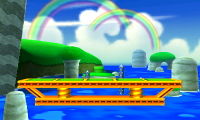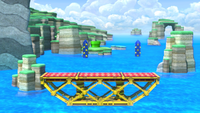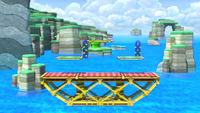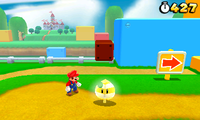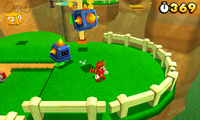3D Land: Difference between revisions
(Added images to stage overview) |
m (→Origin) |
||
| Line 78: | Line 78: | ||
The extending pipes, despite debuting in ''{{s|mariowiki|Super Mario World}}'', never appear in ''Super Mario 3D Land'', though they may be based off of the action of Warp Pipes appearing from the ground for Mario or Luigi to enter (such as in their on-screen appearance), which dates back to titles such as ''Super Mario 64'' and ''Super Mario Galaxy''. | The extending pipes, despite debuting in ''{{s|mariowiki|Super Mario World}}'', never appear in ''Super Mario 3D Land'', though they may be based off of the action of Warp Pipes appearing from the ground for Mario or Luigi to enter (such as in their on-screen appearance), which dates back to titles such as ''Super Mario 64'' and ''Super Mario Galaxy''. | ||
The water area originates from a few different levels. The idea of Mario on moving platforms come from {{iw|mariowiki|World 1-4|Super Mario 3D Land}}, in the form of {{iw|mariowiki|Switchboard}}s, but the background and scenery of the stage mostly resemble {{iw|mariowiki|World 6-1|Super Mario 3D Land}}. The design of the Switchboards, however, are different from ''Super Mario 3D Land'' as they, in the original game are moved by Mario or Luigi standing on a side of the platform featuring arrows. The platform would then move in that direction by the two wheels on the sides along rails. The Switchboards in this stage do not feature the arrows and the wheels, and its movement on the rail is not based on Mario or Luigi's position, but instead moves automatically. This area of the stage also features multiple {{iw|mariowiki|Skewer}}s, which first appeared in ''[[Super Mario World]]'', and have returned in recent ''Mario'' games. In ''Super Mario 3D Land'', Skewers appear in neither World 1-4 nor 6-1, but rather only in certain Airship levels, like {{iw|mariowiki|World 3-Airship|Super Mario 3D Land}} and {{iw|mariowiki|World 6-Airship|Super Mario 3D Land}}. The design of the Skewers has been retained. | The water area originates from a few different levels. The idea of Mario on moving platforms come from {{iw|mariowiki|World 1-4|Super Mario 3D Land}}, in the form of {{iw|mariowiki|Switchboard}}s, but the background and scenery of the stage mostly resemble {{iw|mariowiki|World 6-1|Super Mario 3D Land}}, while the double rainbow seems to originate from {{iw|mariowiki|World 5-5|Super Mario 3D Land}}. The design of the Switchboards, however, are different from ''Super Mario 3D Land'' as they, in the original game are moved by Mario or Luigi standing on a side of the platform featuring arrows. The platform would then move in that direction by the two wheels on the sides along rails. The Switchboards in this stage do not feature the arrows and the wheels, and its movement on the rail is not based on Mario or Luigi's position, but instead moves automatically. This area of the stage also features multiple {{iw|mariowiki|Skewer}}s, which first appeared in ''[[Super Mario World]]'', and have returned in recent ''Mario'' games. In ''Super Mario 3D Land'', Skewers appear in neither World 1-4 nor 6-1, but rather only in certain Airship levels, like {{iw|mariowiki|World 3-Airship|Super Mario 3D Land}} and {{iw|mariowiki|World 6-Airship|Super Mario 3D Land}}. The design of the Skewers has been retained. | ||
In ''Ultimate'', the level gained a graphical upgrade that redesigns some assets to instead match ''{{iw|mariowiki|Super Mario 3D World}}'', such as the background platforms and dirt. | In ''Ultimate'', the level gained a graphical upgrade that redesigns some assets to instead match ''{{iw|mariowiki|Super Mario 3D World}}'', such as the background platforms and dirt. | ||
Revision as of 21:54, January 8, 2023
| Super Mario 3D Land 3D Land | |
|---|---|
{{{content1}}}
{{{content2}}}  3D Land as it appears in Smash. | |
| Universe | Mario |
| Appears in | SSB4 (3DS) Ultimate |
| Availability | Starter |
| Crate type | Normal |
| Maximum players | 4 (3DS) 8 (Ultimate) |
| Article on Super Mario Wiki | Super Mario 3D Land |
| “ | A stage based on Super Mario 3D Land. The screen will scroll automatically, causing all kinds of things to appear. | ” |
| —Super Smash Bros. 4 Official Site | ||
3D Land (3Dランド, 3D Land) (initially called Super Mario 3D Land[1]) is a stage in Super Smash Bros. for Nintendo 3DS and Super Smash Bros. Ultimate. The stage is based as a whole on the game Super Mario 3D Land.
Bowser Jr. is fought here in his unlocking battle in the 3DS game.
Stage overview
The stage is a travelling stage that cycles through four different areas that are composites of different locales from Super Mario 3D Land. While the first and third locations are autoscroll sections (not unlike previous Mario series stages like Rainbow Cruise and Mushroomy Kingdom), the second and fourth place fighters on a set of floating platforms that move into the background.
The first section is a grassy area with colored blocks, where Peach's Castle can be seen in the background. Fighters come across various Brick Blocks and ? Blocks; the latter will spawn items when hit (or jumped into from below), and have a higher than normal chance of spawning a Super Leaf. Donut Blocks later appear; true to Super Mario 3D Land, they'll fall if a fighter stands on them for too long. From a stationary Warp Pipe, Flip Panels will appear to create a path over a pit (nevertheless, the pit is still covered by a metal grate). After a brief area of rest, the fighters will come across one last set of Donut Blocks before a large metallic grate platform (similar to the one below the Flip Panels). Fighters must jump on the platform before in flies into the sky; a Note Block under the platform can assist them should they wind up underneath the platform.
After passing upward through some clouds, the platform arrives in the second section: a valley area with with stone blocks protruding from the cliffs. The fighters must move to a set of four smaller Lifts (clockwise from the top: yellow, red, green, blue) before the metallic platform from below sinks back into the blast zone. From here, the set of Lifts move into the background, towards a group of gray mountains. Along the way, stone blocks will protrude from three differently colored holes (blue, green, yellow), hitting the respectively-colored Lift and slightly rotating it. As there is no red hole, the red Lift will always remain in position. Only two stone blocks will come out per cycle. The Lifts then reach the end of the valley, when they suddenly sink through the same clouds from before.
The fighters are taken to the third section: another grassy area, this time a downhill noticeably near the coastline with abundant trees and a mountain. The Lifts will remain above the ground and scroll offscreen with the stage. As the fighters move down the hill, they'll come across another yellow Lift, followed by a pair of Rotating Blocks where the hill ends. Two sets of Warp Pipes (five in the first, three in the second) are encountered; the first and last pipes of the first set will raise and lower away from and towards the blast zone. At the end of the section are three platforms (in for 3DS, they resemble Switchboards, albeit without arrows, while in Ultimate they are given new designs completely) that the fighters must jump on before they quickly hop down below.
The three platforms land on three different colored rails, as they move once again into the background of the final section: an ocean area with a double rainbow and Skewers in the water. An island with a lone Warp Pipe can be seen in the distance. The rails intertwine around each other, causing the platforms to move in kind. While most of the Skewers remain spinning in the background, a single Skewer will strike one of the platforms from below, breaking half of it and dealing 22% to any fighter hit. Soon after, the platforms speed up until they fly high in the air and land in the aforementioned Warp Pipe; seconds later, the platforms reappear from the Pipe above the grassy area with Peach's Castle; they sink into the ground, and the cycle is restarted.
When playing the music track Super Mario 3D Land Theme / Beach Theme in for 3DS, the stage will employ special looping in which the Ground Theme will loop indefinitely until the fighters reach the downhill area, in which the Beach Theme will start playing. This section of the song will end just as the platforms enter the Warp Pipe, and the music will remain in silence until a few seconds after the cycle has completed back at the grassy area. Note that the Ground Theme has a cleaner loop, while the Beach Theme, as observed by interrupting the scrolling speed of the stage with pausing, Final Smashes, or otherwise, will simply restart after a moment of silence.
This function returns in Super Smash Bros. Ultimate. the Ground Theme retains its special looping. However, the Warp Pipe no longer retains silence; even if the scrolling speed of the stage is not interrupted, the Beach theme will loop and play again for a couple seconds inside the pipe until the platforms spawn back at the grassy area.
When first starting on the stage, players will spawn on four yellow platforms. These platforms will not spawn again on any successive cycles.
Possibly due to causing lag, Skewers will not appear in online play/in For Fun mode.
Ω forms and Battlefield form
In Super Smash Bros. for Nintendo 3DS, the Ω form consists only of a single platform in the water area; in front of the Skewers and final Warp Pipe.
In Super Smash Bros. Ultimate, the Ω form and Battlefield form take place in the water area with a metallic structure acting as the main platform that is resized and reshaped to match Final Destination and Battlefield, respectively. The three soft platforms of the Battlefield form are metallic and are unique to this form.
Origin
This stage as a whole is based on the Nintendo 3DS game Super Mario 3D Land, with each part of the level referencing levels from the game.
The castle area is roughly based around World 1-1 with changes to layout of the platforms and the platforms themselves. The area is also a lot closer to Peach's Castle than it was in Super Mario 3D Land. Flip Panels originate from World 2-1, and while there they are usually activated by stepping on a switch on the ground, here they activate automatically. Note Blocks also appear in the game, originating from Super Mario Bros. 3, and bouncing Mario and Luigi as they do fighters in Smash; this block is two blocks long, as was often the case in Super Mario 3D Land.
The valley area's closest resemblance is World 8-2, in that both levels have steep rock cliffs with grass on top (some of the grass appears as orange in Ultimate); however, the resemblance ends there, as the level in Super Mario 3D Land did not have moving platforms (other than ones that move in a circular pattern), or gray rocks protruding from the cliff sides. The cliff walls are also more red than they are in original game. Other than World 8-2, there are no levels that resemble the valley area.
The downhill area is roughly based on World 4-1. In World 4-1, Mario or Luigi navigates through the level by scaling steep cliff sides with grass tops. In this stage, the design of the soil found on the smaller cliffs with grass has been retained, and the gray rock cliff walls seen in the background are designed around the taller cliff walls in World 4-1. The level also has trees with rounded tops, which were also retained in this stage. However, the end of World 4-1 was located on top of a tree-like structure perched on top of the cliff, meaning that Mario or Luigi is mostly going upward, unlike in this stage where the battle goes downhill.
Rotating blocks appear in World 4-3, Special 3-2, and Special 6-4. While rotating block platforms originate from World 1-5 and World 3-5 of New Super Mario Bros. Wii, the design of the blocks originate from Super Mario 3D Land. In the levels that feature the rotating blocks, the level takes place in the sky above clouds, but in this stage, they're closer to the ground.
The extending pipes, despite debuting in Super Mario World, never appear in Super Mario 3D Land, though they may be based off of the action of Warp Pipes appearing from the ground for Mario or Luigi to enter (such as in their on-screen appearance), which dates back to titles such as Super Mario 64 and Super Mario Galaxy.
The water area originates from a few different levels. The idea of Mario on moving platforms come from World 1-4, in the form of Switchboards, but the background and scenery of the stage mostly resemble World 6-1, while the double rainbow seems to originate from World 5-5. The design of the Switchboards, however, are different from Super Mario 3D Land as they, in the original game are moved by Mario or Luigi standing on a side of the platform featuring arrows. The platform would then move in that direction by the two wheels on the sides along rails. The Switchboards in this stage do not feature the arrows and the wheels, and its movement on the rail is not based on Mario or Luigi's position, but instead moves automatically. This area of the stage also features multiple Skewers, which first appeared in Super Mario World, and have returned in recent Mario games. In Super Mario 3D Land, Skewers appear in neither World 1-4 nor 6-1, but rather only in certain Airship levels, like World 3-Airship and World 6-Airship. The design of the Skewers has been retained.
In Ultimate, the level gained a graphical upgrade that redesigns some assets to instead match Super Mario 3D World, such as the background platforms and dirt.
Tournament legality
The stage is universally banned in all rulesets. The auto-scrolling areas of the stage provide characters with good mobility an unfair advantage because they can simply run away and camp their opponent; some parts of the stage also have walk-off blast lines. The water area has huge skewers that occasionally come up and damage the players while also destroying the platforms.
Gallery
Super Smash Bros. for Nintendo 3DS
3D Land in Super Smash Bros. for Nintendo 3DS.
Super Smash Bros. Ultimate
Pac-Man idling on the stage.
Names in other languages
Trivia
- In the game files of Super Smash Bros. for Wii U, there are unused files for this level along with Mushroomy Kingdom; however, the only file remaining in each directory is the item parameter file.
- This is one of the five stages to not appear in demo sequences in the 3DS version. The others are Mushroomy Kingdom, Dream Land (SSB4), Flat Zone 2 and Super Mario Maker.
- In Super Smash Bros. for Nintendo 3DS, the Note Block changes pitch depending on which track is playing on the stage. This did not occur in Super Mario 3D Land, but rather New Super Mario Bros. 2.
- In Ultimate, the pitch only changes for Super Mario Bros. 3 Medley.
- Interestingly, although Super Mario Bros. 3 Medley does not use the same special looping that Super Mario 3D Land Theme / Beach Theme does for the stage, the length at which it is composed causes it to loop around the same time that the stage itself completes a full cycle, although it will desync eventually.
- A cycle through the stage without any actions that change the speed of scrolling lasts about two minutes and five seconds.
- If the true All-Star Mode has not been unlocked in the 3DS version of Smash 4, this stage can still appear as the 6th stage, despite no Mario characters appearing at the time, due to Bowser Jr. being unlockable in that game.
- In Ultimate, the following Assist Trophies cannot appear on this stage: Chain Chomp, Thwomp, Waluigi, Skull Kid, Metroid, Nightmare, Andross, Tiki, Ashley, Color TV-Game 15, Devil, Yuri Kozukata, Arcade Bunny, Squid Sisters, Shadow the Hedgehog and Rathalos. Additionally, the following Poké Ball Pokémon cannot be summoned: Abra, Alolan Exeggutor, Lugia, Metagross, Palkia, Darkrai, Zoroark, Swirlix, Inkay and Lunala.
References




